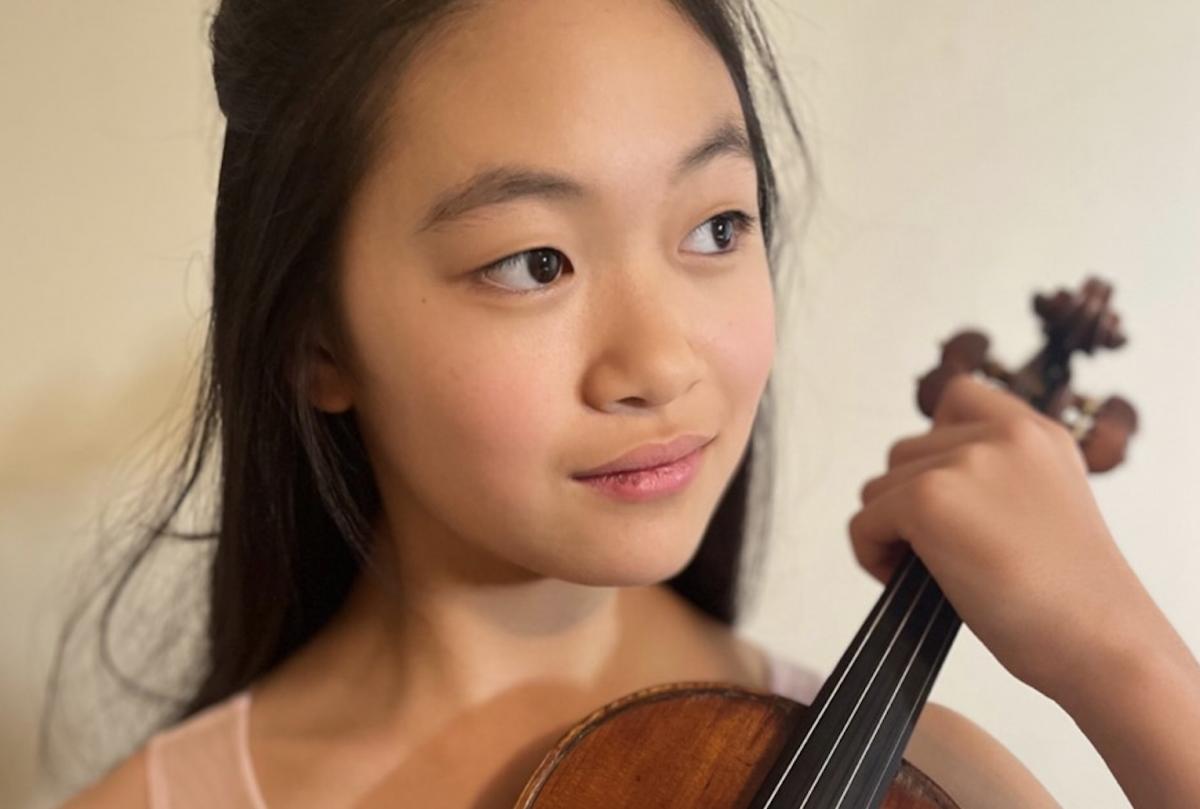It was an evening for celebrating winners and also of remembrance at the opener of the penultimate concert series of the Mid-Atlantic Symphony Orchestra’s (MSO) 2022-23 season.
 Chief among the winners in Easton Thursday evening was Michael Repper. Repper was making his first appearance conducting the MSO since being awarded the Grammy for Best Orchestral Performance last month for the album he recorded with fellow Grammy winners – New York Youth Symphony (NYYS) musicians.
Chief among the winners in Easton Thursday evening was Michael Repper. Repper was making his first appearance conducting the MSO since being awarded the Grammy for Best Orchestral Performance last month for the album he recorded with fellow Grammy winners – New York Youth Symphony (NYYS) musicians.
Featured on this opening night was Elizabeth Song, the 13-year-old New Jersey violinist who won first prize in MSO’s Elizabeth Loker Concerto Competition in January. The three concerts Song performs with the orchestra through Saturday, March 11, are part of her prize, along with a $2,000 cash award.
First up in Thursday’s concert was Brahms’ circa 1880 Tragic Overture, a stand-alone symphonic movement, somber in sharp contrast to another he composed near the same time – the high-spirited Academic Festival Overture. This Brahms piece opened with a bombastic D minor temperament urged on by an animated Repper dressed all in black. Intermittent F major passages were more flowing, with an emphasis on strings led by concertmaster Kimberly McCollum, punctuated by clarion calls with Mark Hughes and others in the brass section taking the lead.
Repper next introduced violinist Song by her preferred nickname, Poppy. Song performed the same concerto she played in the competition finals on January 12 at Easton’s Avalon Theater. But this time, she was making her debut with a full orchestra instead of piano accompaniment. Belgian composer Henri Vieuxtemps’ Violin Concerto No. 5, published in 1861, was all but forgotten until rediscovered by 20th-century orchestras and solo musicians. It has become a favorite in competitions because of the technically challenging and listener-friendly phrasing that gives violinists ample opportunities to show off their virtuosity.
After peering back at the orchestra during its celebratory opening, Song took every advantage of her opportunity, deftly diving in and out of rapid changes in pace and mood, from sweet to urgent. During a tumbling stretch of demands on her prodigious skill, she mastered the vicissitudes of the concerto as if it were child’s play. From attack mode to lullaby, she induced weeping-for-joy-or-sorrow glides of emotion while wielding see-saw strokes up and down – almost making her instrument chatter with excitement. Astonishingly, Song has improved on her winning performance just two months ago, though credit must also go to the maestro and the 38 orchestral musicians who made her debut such a smash.
MSO’s concerto competition was named in memory of Elizabeth Loker before the inaugural event in 2019-20. What was to be the second annual competition was delayed three years by COVID. Loker, better known to friends, colleagues, and loved ones as Beth, died of cancer in 2015. Retired from the Washington Post as vice president of publishing technology, Loker moved to Royal Oak and became a board member of both the MSO and the Chesapeake Bay Maritime Museum. Next year’s competition will accommodate three finalists, who will each get to perform with the orchestra.
Song’s performance was a tough act to follow. But after intermission, Repper conducted the MSO in Florence Price’s Symphony No. 1, which won the previous Best Orchestral Performance Grammy for its recording by the Philadelphia Orchestra.
The four-movement symphony begins with a modest passage drawing from African folk tunes, quickly building to a strings-and-percussion crescendo before settling into a hymn-like gospel pastoral. The second movement features a melody inspired or borrowed from Dvorak’s New World Symphony, with horns and reeds joined by strings and drums for a gratifying conclusion. Movement three breaks out in a party mood to a cowboy theme not out of place on “Yellowstone.” Trumpets, led by Josh Carr, declare that it’s time to dance and have fun. The final movement enlists every corner of the orchestra toward a frenzied but disciplined race to the finish.
Price has become a programing favorite of American orchestras – long after her 1953 death – in both February’s Black History Month and March’s Women’s History Month. As the first African-American woman to have her classical music composition performed by a major orchestra – Chicago Symphony in 1933 – Price’s works, most recently discovered in what was once her summer home, deserve attention in both months and all the other 10. That first-ever piece was her Symphony No. 1.
This year’s Grammy-winning album, with Repper conducting the NYYS, includes two other Price compositions – “Ethiopia’s Shadow in America” and her Piano Concerto in One Movement – as well as pieces by Valerie Coleman and Jessie Montgomery, two living African-American female composers.
Personally, I look forward to the day when neither black nor women’s history needs a special recognition month but are broadly recognized throughout the year.
Mid-Atlantic Symphony Orchestra’s March Concerts
Opening date in the series was Thursday night, March 9, Easton Church of God
7:30 p.m., Friday, March 10, Community Church, Ocean Pines
3 p.m. Saturday, March 11, Epworth United Methodist Church, Rehoboth Beach
midatlanticsymphony.org
Steve Parks is a retired New York arts critic now living in Easton.




Sue Regier says
A spectacular performance by an amazing orchestra. Poppy Song stole our hearts and the show! Bravo!
Charles Barranco says
A flawless performance last night by Ms Song! She is fantastic and only 13 yrs old! I think she has a future!
Tom setting says
Professional write-up and reflective of the MSO’s 3/9 performance. Appropriate comment on ignoring artists race sex, etc.